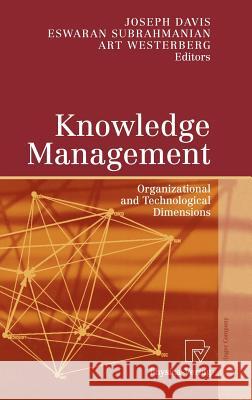Knowledge Management: Organizational and Technological Dimensions » książka
Knowledge Management: Organizational and Technological Dimensions
ISBN-13: 9783790800814 / Angielski / Twarda / 2005 / 204 str.
The importance and value of tracking and sharing the dispersed knowledge resources of contemporary organizations have received widespread rec- nition in recent years. It is widely believed that with the transition from the industrial to information-based economies, organizational knowledge has emerged as the single most critical resource at both macro- and mic- levels. A major challenge for most organizations during this transition and beyond is to learn to deal with the intricacies of discovering knowledge from the vast amounts of data being generated, identifying pockets of - portant knowledge in various forms, to devise strategies and techniques to formalize parts that lend themselves to codification, and to nurture tech- cal and other solutions with which useful knowledge can be shared among relevant participants. This has the potential to produce greater knowledge utilization leading to multiplier effects in organizational performance. This calls for an approach in which both the organizational and technological dimensions of the challenge are better understood and effectively integ- ted. The papers included in this volume were selected from a collection of papers presented at an invitation-only workshop entitled 'Knowledge - nagement (KM) and the Global Firm: Organizational and Technological Dimensions' held at the University of Sydney in Sydney, Australia in February 2003. The workshop was made possible by a generous grant from the Carnegie Bosch Institute at Carnegie Mellon University, Pit- burgh, USA.











